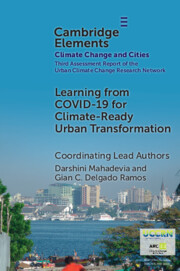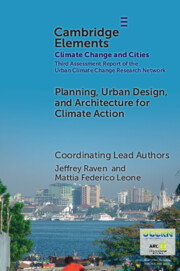Learning from COVID-19 for Climate-Ready Urban Transformation
Cities have suffered from three years of the COVID-19 pandemic and are increasingly experiencing exacerbated heatwaves, floods, and droughts due to climate change. Going forward, cities need to address both climate and public health crises effectively while reducing poverty and inequity, often in the context of economic pressure and declining levels of trust in government. The COVID-19 pandemic has revealed gaps in city readiness for simultaneous responses to pandemics and climate change, particularly in the Global South. However, these concurrent challenges to cities present an opportunity to reformulate current urbanization patterns and the economies and dynamics they enable. This Element focuses on understanding COVID-19's impact on city systems related to climate change mitigation and adaptation, and vice versa, in terms of warnings, lessons learned, and calls to action. This title is also available as open access on Cambridge Core.
Product details
March 2025Paperback
9781009527293
75 pages
229 × 152 mm
Not yet published - available from March 2025
Table of Contents
- List of Contributors
- Series Preface
- Foreword I
- Foreword II
- Major Findings and Key Messages
- 1. Introduction and Framing
- 2. COVID-19, Vulnerability, and Informality
- 3. COVID-19 Interactions at the Urban Scale
- 4. COVID-19 and Urban Systems: Built Environment, Transportation, and Waste
- 5. COVID-19 Interactions with Urban Ecology 6. COVID-19 Governance and Urban Climate Action
- 7. COVID-19, Energy, and Economics
- 8. Learning from COVID-19: Accelerating Urban Transformational Pathways
- Appendix
- References.







